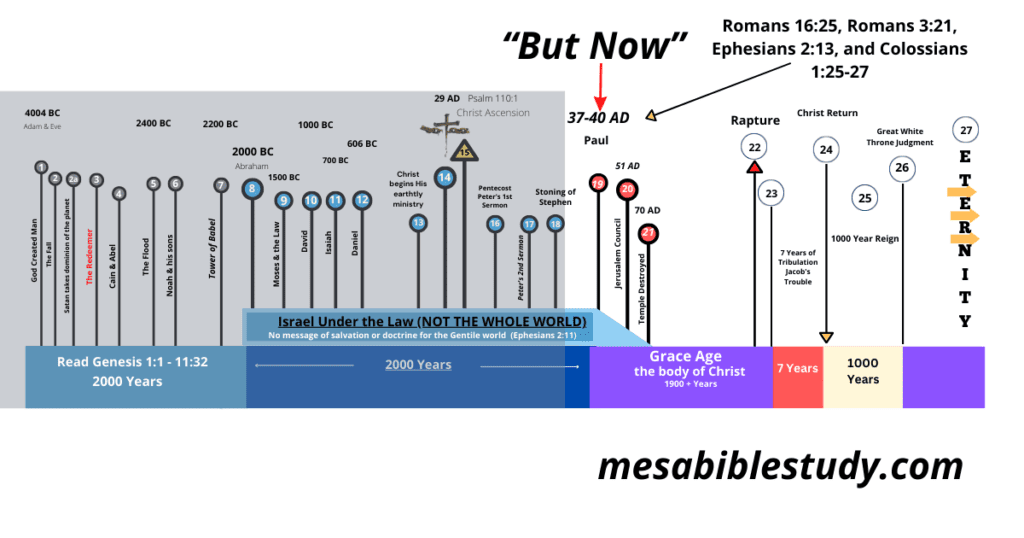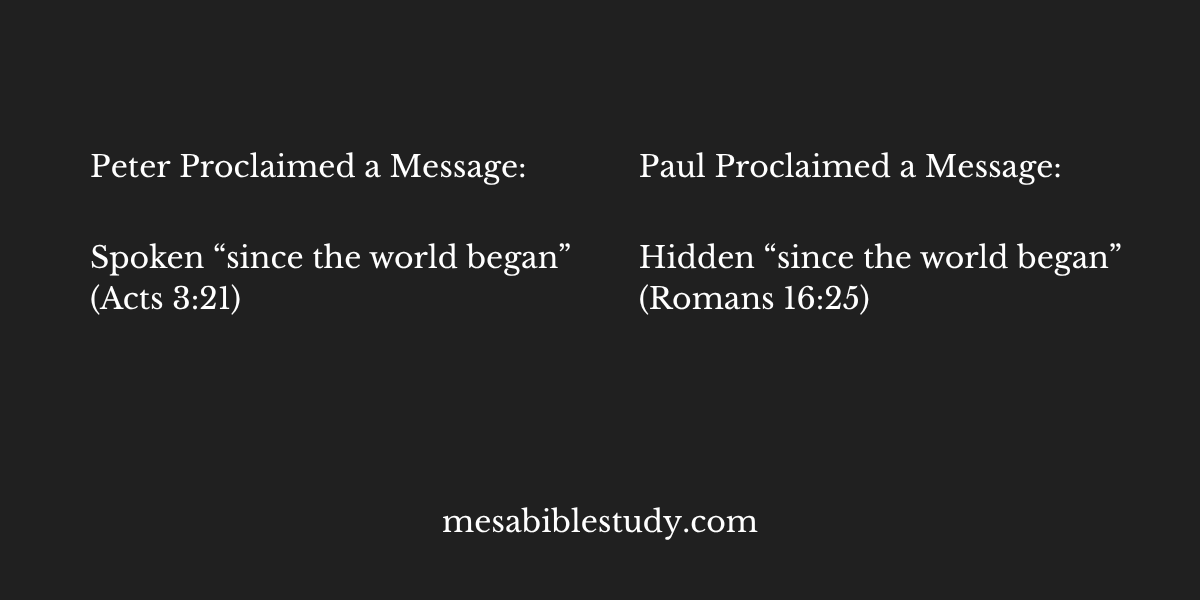This is Part 1 of the series The Mysteries Revealed to Paul, exploring the divine truths hidden in God and revealed to the Apostle Paul.
Introduction
One of the most transformative truths in God’s word is recognizing the distinct roles of the Apostle Paul and the Twelve Apostles in God’s redemptive plan. Many assume Paul simply joined Peter’s team after his conversion—but Scripture reveals something radically different.
Paul was given a new message by revelation from the risen Lord Jesus Christ: the Gospel of the Grace of God and the unveiling of divine “mysteries” kept hidden since before the foundation of the world. In contrast, Peter and the Eleven preached the prophetic program—truths “spoken by the mouth of all His holy prophets since the world began” (Acts 3:21)
This post explores that crystal-clear distinction: what a “mystery” truly is, how God progressively revealed His plan, and why Paul’s unique apostleship changes how we understand the Church Age, and Israel’s future.
1. What Is a “Mystery” in Scripture?
The word mystery (mystērion, Greek) means a secret or hidden truth known only to God until He chooses to reveal it. It’s not a riddle to solve but a truth that was completely concealed until God made it known.
“The secret things belong to the LORD our God, but those things which are revealed belong to us and to our children forever.” — Deuteronomy 29:29
This verse establishes that God, in His sovereignty, keeps secrets and reveals them in His timing. Once revealed, they belong to us to believe and obey.
Paul uses mystery repeatedly in his epistles (Romans through Philemon) to describe truths that were hidden from the prophets, the Gospels, and early Acts.
“Now to Him who is able to establish you according to my gospel and the preaching of Jesus Christ, according to the revelation of the mystery kept secret since the world began.” — Romans 16:25–26
This stands in direct contrast to Peter’s message:
“Which God has spoken by the mouth of all His holy prophets since the world began.” — Acts 3:21
The prophetic program was foretold; Paul’s mysteries were hidden. This is the foundation for understanding God’s eternal purpose which He accomplished in Christ Jesus our Lord.
2. The Progressive Nature of Biblical Revelation
The Bible is a progressive revelation. God unfolded His truth in stages, through different people and dispensations, according to His sovereign purpose.
- To Moses, God gave the Law, establishing Israel as His covenant nation (Exodus 19:5–6).
- To the prophets, God revealed the coming Messiah and Israel’s restoration (Isaiah 9:6–7).
- To Peter and the Eleven, Christ entrusted the Gospel of the Kingdom, calling Israel to repentance (Matthew 10:5–7; Acts 2:36).
- To Paul, the ascended Lord revealed the Dispensation of Grace (Ephesians 3:2), unveiling mysteries never before made known—centered on the Body of Christ and salvation by grace through faith alone.
This progressive revelation means we cannot merge the Gospel of the Kingdom (prophecy) with the Gospel of Grace (mystery). Mixing them obscures God’s distinct purposes and leads to confusion.
3. Paul’s Unique Calling as the Apostle to the Gentiles
Paul’s apostleship was not a continuation of Peter’s ministry—it was a divine commissioning for a new dispensation.
“But the Lord said to him, ‘Go, for he is a chosen vessel of Mine to bear My name before Gentiles, kings, and the children of Israel.’” — Acts 9:15
Unlike the Twelve—who were sent to Israel during Christ’s earthly ministry—Paul was sent to the Gentiles with a new message of grace.
“For I speak to you Gentiles; inasmuch as I am an apostle to the Gentiles, I magnify my ministry.” — Romans 11:13
Paul emphasized that his gospel came directly from the risen Lord, not from man:
“But I make known to you, brethren, that the gospel which was preached by me is not according to man. For I neither received it from man, nor was I taught it, but it came through the revelation of Jesus Christ.” — Galatians 1:11–12
At the Jerusalem Council, the distinction between Paul’s ministry and Peter’s was formally recognized:
“They saw that the gospel for the uncircumcised had been committed to me, as the gospel for the circumcised was to Peter.” — Galatians 2:7–9
Paul’s revelation of the Body of Christ was unknown to Peter and the Eleven. Their message was prophetic; Paul’s was mysterious—hidden until revealed through him.
4. Biblical Timeline

5. The Eight Mysteries Revealed to Paul
To grasp the magnitude of Paul’s apostleship, consider the eight divine mysteries revealed exclusively to him—truths defining the Church Age.
| Mystery | Reference | Explanation |
| 1. Mystery of His Will | Ephesians 1:9–10 | God’s plan to reconcile all things in Christ, in heaven and on earth, apart from Israel’s covenants. |
| 2. Mystery of Christ | Ephesians 3:3–6 | Christ as Head of the Body, uniting Jew and Gentile equally in one spiritual organism. |
| 3. Mystery of the Body of Christ | Colossians 1:24–27 | The Church—Christ indwelling believers—was hidden from past generations. |
| 4. Mystery of God | Colossians 2:1–3 | Reveals the fullness of the Triune God in Christ, the source of all wisdom and completeness. |
| 5. Mystery of Godliness | 1 Timothy 3:16 | God manifest in flesh, justified in Spirit, preached among Gentiles—revealed as the pattern for godly living. |
| 6. Mystery of Israel’s Blinding | Romans 11:25 | Israel’s partial, temporary blindness until the fullness of the Gentiles comes in. |
| 7. Mystery of the Rapture | 1 Corinthians 15:51–52; 1 Thessalonians 4:16–17 | The sudden translation of the Church—a truth never prophesied. |
| 8. Mystery of Iniquity | 2 Thessalonians 2:7 | The restrained power of lawlessness that will culminate in the rise of the Antichrist after the Rapture. |
6. The Undeniable Contrast
The difference between Peter’s prophetic gospel and Paul’s revealed mysteries is undeniable:
| Peter’s Prophetic Program | Paul’s Mystery Program |
| Spoken “since the world began” (Acts 3:21) | Hidden “since the world began” (Romans 16:25) |
| Focused on Israel and the earthly kingdom | Focused on Jew and Gentile in one Body |
| Message: repentance, baptism, Messiah’s reign (Acts 2:38) | Message: grace through faith alone (1 Corinthians 15:1–4) |
| Law still in operation | Law nailed to the Cross (Colossians 2:14) |
| Earthly hope in the Kingdom | Heavenly hope in Christ (Philippians 3:20–21) |
Peter’s ministry looked forward to Israel’s restoration; Paul’s revelation unveiled a new Body of believers destined for heaven.
7. End-Time Events: Magnified, Not Diminished
Recognizing Paul’s distinct message doesn’t diminish prophecy—it magnifies it. The mystery of the Church Age fills the prophetic gap between Israel’s rejection and her future restoration.
“Blindness in part has happened to Israel until the fullness of the Gentiles has come in.” — Romans 11:25
Israel’s blindness is partial, not permanent. When the Church is caught up, God will resume His dealings with Israel, fulfilling every promise and covenant (Romans 11:26–29). God’s faithfulness to Israel guarantees His faithfulness to us.
8. Why This Matters
Understanding this distinction changes everything. It clears confusion about salvation, the Church, and prophecy. We are not under Israel’s law or kingdom program but under grace.
“For you are not under law but under grace.” — Romans 6:14
Paul’s epistles (Romans–Philemon) are God’s instructions for the Church today. They reveal our position in Christ, our heavenly hope, and our walk under grace until the trumpet sounds.
“For the Lord Himself will descend from heaven with a shout… and the dead in Christ will rise first. Then we who are alive and remain shall be caught up together with them in the clouds to meet the Lord in the air.” — 1 Thessalonians 4:16–17
Conclusion
The crystal-clear distinction between Paul’s mysteries and the prophetic program is the key to understanding God’s great plan of salvation. God’s prophetic dealings with Israel were paused, not canceled, to make room for this present dispensation of grace.
Paul’s mysteries unveil the hidden purpose of God: one Body, one Head, one heavenly hope. Understanding these truths illuminates all Scripture and magnifies the faithfulness of God.
Scripture References
Acts 3:21; Romans 16:25–26; Ephesians 3:2–6; Galatians 1:11–12; Romans 11:25–29; Colossians 1:24–27; 1 Thessalonians 4:16–17; 2 Timothy 2:15; Deuteronomy 29:29.
🔄 Continue the Series
You’re reading Part 1 of the series The Mysteries Revealed to Paul.

0 Comments